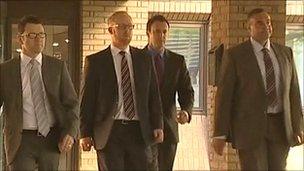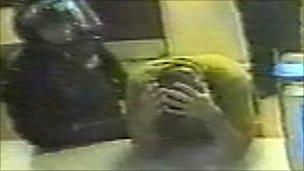Babar Ahmad: trial concluded after eight years
- Published

The four officers were part of an arrest team in a dawn raid in December 2003
A jury at Southwark Crown Court has found four Metropolitan police officers not guilty of assaulting a terrorism suspect. But it has taken almost eight years for the story to be fully told in the British courts.
Shortly after 0500 GMT on a December morning in 2003, Babar Ahmad and his wife were asleep in their home in Tooting, south London.
They did not know that more than a dozen police officers were about to burst in. And, until March of this year, they did not know that their home had already been bugged by MI5.
The recording from that bug was played during the trial of the four officers from that arrest team who, almost eight years on, have been found not guilty of assaulting Mr Ahmad during the dawn raid.
Roderick James-Bowen, Mark Jones, Nigel Cowley and John Donoghue, then all constables in the Met's Territorial Support Group (TSG), had been told by senior officers to arrest Mr Ahmad.
He was believed to be the leader of an al-Qaeda-linked cell that acted as a conduit to terrorism overseas, providing recruits and logistical support.
And so, in the early hours of that morning, the officers were told to prepare to confront a highly-trained terrorist: someone with a shrapnel wound from fighting overseas - and someone similar to Kamel Bourgass, the man all police officers knew had recently killed a detective in Manchester.
Babar Ahmad, a martial arts enthusiast, was thought to be trained in armed and unarmed combat.
'Deck and dominate'

In custody: Mr Ahmad claimed he was assaulted on the way to the police station
Pc James-Bowen was the first of the four officers to reach the bedroom and told the jury he assessed that Mr Ahmad was in a fighting stance, looking for a weapon. The police strategy was simple - to "deck and dominate" the suspect by bringing him down if needs be, handcuffing him and making sure he could not escape or injure officers.
But there was no common ground between the four officers and Babar Ahmad over what happened next.
According to Mr Ahmad's account, he put his hands up, but was subjected to a prolonged series of assaults which included kicks, punches, stamps on his feet and injuries caused by officers twisting handcuffs.
The officers said, however, that he resisted arrest, fighting with all his strength against them. In short, his injuries were caused by not going quietly.
One of the most sensitive allegations made by Mr Ahmad is that the officers mocked his religion. After he was released without charge, he claimed that he had been taken downstairs to the room he used for prayers. He alleged that officers made him kneel and one said: "Where is your God now?"
At the time, that single remark had huge implications for relations between the Metropolitan Police and Muslim communities. Pressure groups repeated the comment time and again at public meetings, presenting the police as waging a war on Muslims.
Not the final chapter
In three days of evidence, Mr Ahmad insisted that he would never forget the jibe.
Crucially, although the MI5 bug captured screams, shouts and even the tinkle of a broken window upstairs, those words could not be heard in the recording played to the jury.
But what the jury did not know, because of rules designed to ensure a fair and unprejudiced trial, is that Babar Ahmad has already sued for assault - and the Metropolitan Police's Commissioner has admitted liability, paying him £60,000 in damages.
He took that action after the Crown Prosecution Service had initially concluded that the officers should not be tried. The Met's pay-out prompted the CPS to review the case and to charge the officers after all.
Babar Ahmad's father, Ashfaq, said his son would be disappointed with the verdict.
"But he will have the satisfaction that he had the chance to go in front of the world, and the media, the jury and the court to say 'this is what happened to me, and I am honest and I am telling the truth'," he told the BBC.
But the acquittal of the four officers at Southwark Crown Court is not the final chapter.
It paves the way for the Metropolitan Police Authority to publish an investigation into the Babar Ahmad affair. Retired judge Sir Geoffrey Grigson was brought in to oversee the Metropolitan Police's own investigation into what happened in December 2003.
- Published5 May 2011
- Published9 May 2011